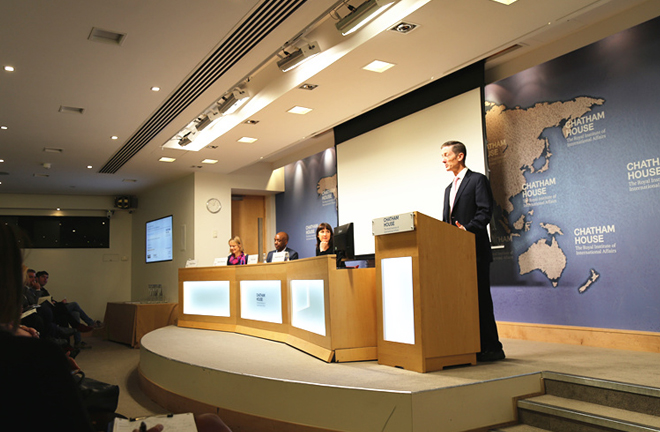Challenges arise in digital age

Chatham House held an international conference themed “Future of Work 2018” in London on May 24. (ZHAO YUAN/CSST)
LONDON—Times are changing. Powerful new technologies like robotics, artificial intelligence and computer algorithms are fundamentally reshaping our world, increasing productivity and improving lives. But what will happen to our jobs? On May 24, Chatham House held an international conference themed “Future of Work 2018” in London, shedding lights on the opportunities and risks in a digital age.
“Automation and Artificial Intelligence clearly can be utilized to boost productivity,” said Carl Benedikt Frey, co-director of the Oxford Martin Programme on Technology and Employment at Oxford University. “It can either do so by displacing workers in certain tasks—productivity grows in a way that it pushes wages down and reduces the labor costs—or it can do so in a happy way by complementing our skills and raising wages in the process. For the time being, it seems to be in a period where AI is replacing us in certain tasks rather than augmenting our skills. But I think there are reasons to be optimistic about the future because in previous industrial revolutions, people adapted their skill sets in a way that complemented technology, wages tended to grow and so did productivity.”
Frey contended that there are also risks. Unskilled workers will continue to be the main losers to automation. Through task simplification and prefabrication, particularly in the construction sector, many jobs of low-skill workers are replaced by automation, and the same thing happens in logistics, transportation and manufacturing and retail. Outside options for low skill workers are gradually disappearing, which explains why wages have declined for low-skill workers over a few decades. “That is a trend we think is likely to continue. Policymakers should acknowledge that automation brings both winners and losers,” said Frey.
James Manyika, chairman and director of the McKinsey Global Institute, said, “The thing that worries me the most is not the question of whether there will be enough jobs. I worry about how to train people. How do we help their transitions from one occupation to another? That’s the hardest challenges.”
Northeastern University President Joseph Aoun said life-long learning is needed to face the challenges of the digital age. “Experiential learning is the best way to allow people to be exposed to diverse perspectives,” he said. “New jobs will be created, and some jobs become obsolete, so we all need to upskill ourselves”
Aoun said that in the United States there are an increasing number of life-long learners, so somebody has to serve them. Universities have to learn to embrace adult education, providing customized curricula and accessible learning materials. Adult education is an opportunity to keep higher education relevant to society. Moreover, machine learning and other new technologies can be integrated into the curricula to foster customized life-long education.
“Making sure people have human contact in the digital age is important. Abraham Maslow’s hierarchy of needs attempted to identify what matters to people, and of course there are individual differences, and cultural differences, but to human beings, interpersonal communication is significant. Life-long learning is crucial as well and better education should be from a rather early time onward. A lot of people are going to be self-employed in the future, using the technology to make jobs for themselves, and with better education, more people can do that,” said Margaret Boden, a professor who researches cognitive science at the University of Sussex.
ZHAO YUAN is a correspondent with Chinese Social Sciences Today.

 PRINT
PRINT CLOSE
CLOSE